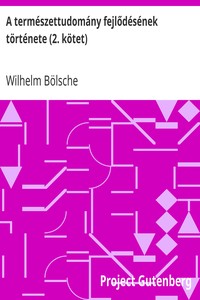A természettudomány fejlődésének története (2. kötet) by Wilhelm Bölsche
"A természettudomány fejlődésének története (2. kötet)" by Wilhelm Bölsche is a scientific publication written in the early 20th century. This work delves into the historical evolution of natural sciences, particularly focusing on the transformative ideas and discoveries from the time of Kepler to Newton. It likely encompasses various philosophical and empirical developments that have shaped our modern understanding of the universe. The opening of the book introduces the journey of scientific thought
during the pivotal period of the 16th and 17th centuries. It begins with the life and work of Johannes Kepler, highlighting his transition from mystical speculation to precise scientific measurement and observation. The text captures Kepler's struggles and achievements in formulating his planetary laws, particularly his realization that planets follow elliptical orbits rather than perfect circles. This sets the stage for the significant advancements made by Isaac Newton and the subsequent contributions to the fields of astronomy and physics, illustrating the gradual shift in understanding the cosmos from a mystical to a more empirical foundation. (This is an automatically generated summary.)
Read now or download (free!)
| Choose how to read this book | Url | Size | ||||
|---|---|---|---|---|---|---|
| Read online (web) | https://www.gutenberg.org/ebooks/68026.html.images | 217 kB | ||||
| EPUB3 (E-readers incl. Send-to-Kindle) | https://www.gutenberg.org/ebooks/68026.epub3.images | 182 kB | ||||
| EPUB (older E-readers) | https://www.gutenberg.org/ebooks/68026.epub.images | 183 kB | ||||
| EPUB (no images, older E-readers) | https://www.gutenberg.org/ebooks/68026.epub.noimages | 158 kB | ||||
| Kindle | https://www.gutenberg.org/ebooks/68026.kf8.images | 380 kB | ||||
| older Kindles | https://www.gutenberg.org/ebooks/68026.kindle.images | 360 kB | ||||
| Plain Text UTF-8 | https://www.gutenberg.org/ebooks/68026.txt.utf-8 | 199 kB | ||||
| Download HTML (zip) | https://www.gutenberg.org/cache/epub/68026/pg68026-h.zip | 172 kB | ||||
| There may be more files related to this item. | ||||||
About this eBook
| Author | Bölsche, Wilhelm, 1861-1939 |
|---|---|
| Translator | Schöpflin, Aladár, 1872-1950 |
| Title | A természettudomány fejlődésének története (2. kötet) |
| Original Publication | Hungary: Franklin,1912. |
| Note | Reading ease score: 45.9 (College-level). Difficult to read. |
| Credits | Albert László from page images generously made available by the Library of the Hungarian Academy of Sciences |
| Language | Hungarian |
| LoC Class | Q: Science |
| Subject | Science -- History |
| Category | Text |
| EBook-No. | 68026 |
| Release Date | May 8, 2022 |
| Copyright Status | Public domain in the USA. |
| Downloads | 137 downloads in the last 30 days. |
| Project Gutenberg eBooks are always free! | |

